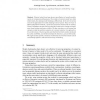529 search results - page 62 / 106 » Causal Time Calculus |
JSS
2006
13 years 8 months ago
2006
This paper describes an approach to the feature location problem for distributed systems, that is, to the problem of locating which code components are important in providing a pa...
AI
2005
Springer
13 years 8 months ago
2005
Springer
We present a formalism for representing the formation of intentions by agents engaged in cooperative activity. We use a syntactic approach presenting a formal logical calculus tha...
ICDM
2010
IEEE
13 years 6 months ago
2010
IEEE
Temporal causal modeling has been a highly active research area in the last few decades. Temporal or time series data arises in a wide array of application domains ranging from med...
CORR
2011
Springer
13 years 15 days ago
2011
Springer
Wireless systems comprised of rechargeable nodes have a significantly prolonged lifetime and are sustainable. A distinct characteristic of these systems is the fact that the node...
FOSSACS
2005
Springer
14 years 2 months ago
2005
Springer
Nominal calculi have been shown very effective to formally model a variety of computational phenomena. The models of nominal calculi have often infinite states, thus making model ...

